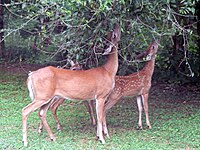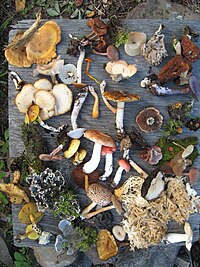
Leaf volatile and nonvolatile metabolites show different levels of specificity in response to herbivory
Sign Up to like & getrecommendations! Published in 2023 at "Ecology and Evolution"
DOI: 10.1002/ece3.10123
Abstract: Abstract Plants produce diverse chemical defenses with contrasting effects on different insect herbivores. Deploying herbivore‐specific responses can help plants increase their defensive efficiency. Here, we explore how variation in induced plant responses correlates with herbivore… read more here.
Keywords: volatile nonvolatile; nonvolatile leaf; leaf; specificity ... See more keywords

Bottom‐up and top‐down effects of tree species diversity on leaf insect herbivory
Sign Up to like & getrecommendations! Published in 2017 at "Ecology and Evolution"
DOI: 10.1002/ece3.2950
Abstract: Abstract The diversity of plant neighbors commonly results in direct, bottom‐up effects on herbivore ability to locate their host, and in indirect effects on herbivores involving changes in plant traits and a top‐down control by… read more here.
Keywords: bottom top; diversity; herbivory; neighbor identity ... See more keywords

Herbivory and pollen limitation at the upper elevational range limit of two forest understory plants of eastern North America
Sign Up to like & getrecommendations! Published in 2018 at "Ecology and Evolution"
DOI: 10.1002/ece3.3397
Abstract: Abstract Studies of species' range limits focus most often on abiotic factors, although the strength of biotic interactions might also vary along environmental gradients and have strong demographic effects. For example, pollinator abundance might decrease… read more here.
Keywords: seed; range; herbivory; upper elevational ... See more keywords

Weak latitudinal gradients in insect herbivory for dominant rangeland grasses of North America
Sign Up to like & getrecommendations! Published in 2020 at "Ecology and Evolution"
DOI: 10.1002/ece3.6374
Abstract: Abstract Patterns of insect herbivory may follow predictable geographical gradients, with greater herbivory at low latitudes. However, biogeographic studies of insect herbivory often do not account for multiple abiotic factors (e.g., precipitation and soil nutrients)… read more here.
Keywords: latitudinal gradients; herbivory; insect herbivory; grass species ... See more keywords

Differential effects of ecosystem engineering by the superb lyrebird Menura novaehollandiae and herbivory by large mammals on floristic regeneration and structure in wet eucalypt forests
Sign Up to like & getrecommendations! Published in 2022 at "Ecology and Evolution"
DOI: 10.1002/ece3.8956
Abstract: Abstract Ecosystem engineers that modify the soil and ground‐layer properties exert a strong influence on vegetation communities in ecosystems worldwide. Understanding the interactions between animal engineers and vegetation is challenging when in the presence of… read more here.
Keywords: herbivory large; structure; vegetation; large mammals ... See more keywords

Consumer mobility predicts impacts of herbivory across an environmental stress gradient.
Sign Up to like & getrecommendations! Published in 2019 at "Ecology"
DOI: 10.1002/ecy.2910
Abstract: Environmental stress impedes predation and herbivory by limiting the ability of animals to search for and consume prey. We tested the contingency of this relationship on consumer traits, and specifically hypothesized that herbivore mobility relative… read more here.
Keywords: environmental stress; herbivory; sheltered locations; consumer ... See more keywords

The chemical ecology of tropical forest diversity: Environmental variation, chemical similarity, herbivory, and richness.
Sign Up to like & getrecommendations! Published in 2022 at "Ecology"
DOI: 10.1002/ecy.3762
Abstract: Species richness in tropical forests is correlated with other dimensions of diversity, including the diversity of plant-herbivore interactions and the phytochemical diversity that influences those interactions. Understanding the complexity of plant chemistry and the importance… read more here.
Keywords: ecology; similarity; diversity; chemical ... See more keywords

Priority effects in coral–macroalgae interactions can drive alternate community paths in the absence of top‐down control
Sign Up to like & getrecommendations! Published in 2022 at "Ecology"
DOI: 10.1002/ecy.3831
Abstract: Abstract The outcomes of species interactions can vary greatly in time and space with the outcomes of some interactions determined by priority effects. On coral reefs, benthic algae rapidly colonize disturbed substrate. In the absence… read more here.
Keywords: priority; juvenile corals; herbivory; coral cover ... See more keywords

Heritable plant phenotypes track light and herbivory levels at fine spatial scales
Sign Up to like & getrecommendations! Published in 2018 at "Oecologia"
DOI: 10.1007/s00442-018-4116-4
Abstract: Organismal phenotypes often co-vary with environmental variables across broad geographic ranges. Less is known about the extent to which phenotypes match local conditions when multiple biotic and abiotic stressors vary at fine spatial scales. Bittercress… read more here.
Keywords: plant phenotypes; plant; spatial scales; herbivory ... See more keywords

Human altered disturbance patterns and forest succession: impacts of competition and ungulate herbivory
Sign Up to like & getrecommendations! Published in 2019 at "Oecologia"
DOI: 10.1007/s00442-019-04370-8
Abstract: Human activities are altering patterns of ungulate herbivory and wildfire regimes globally with large potential impacts on plant community succession and ecosystem resilience. Aspen (Populus tremuloides) is a keystone species which co-exists with conifer species… read more here.
Keywords: ungulate herbivory; herbivory; recruitment; competition ... See more keywords

Herbivory regulates the establishment of a native species of submerged aquatic vegetation (SAV) in a tidal estuary of the USA
Sign Up to like & getrecommendations! Published in 2019 at "Oecologia"
DOI: 10.1007/s00442-019-04439-4
Abstract: Herbivores are a diverse group of fauna that shape the distribution and composition of plant communities. In some cases, herbivory may prevent the re-establishment of submerged aquatic vegetation (SAV), such as Vallisneria americana, into systems.… read more here.
Keywords: sav; submerged aquatic; herbivory; vegetation sav ... See more keywords